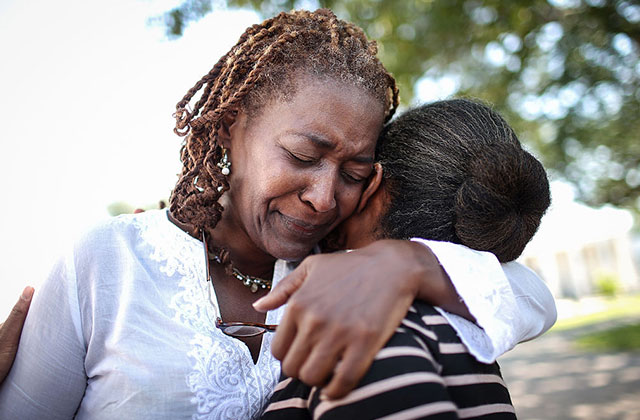Science has already shown how climate change can impact the environment and public health, but the global problem affects mental health too.
A report the American Psychological Association released yesterday (March 29), in partnership with Climate for Health and ecoAmerica, lays out how the change in weather, agriculture and livability patterns—all steadily increasing due to climate change—negatively impact the mental health of those experiencing and harboring the trauma of such changes. The 36-page document explains it can lead to PTSD, stress and anxiety.
What’s worse, communities of color exhibit these symptoms more than others. As the report notes, this is, in part, due to economic status, outdated infrastructure in their neighborhoods and reduced access to healthcare.
“For indigenous communities, climate change may threaten not only their physical home but also their lifestyle, including access to traditional food and culturally meaningful practices,” the report says.
Children and infants see a disproportionate impact as well.
The report goes on:
Some human health effects stem directly from natural disasters exacerbated by climate change, like floods, storms, wildfires, and heat waves. Other effects surface more gradually from changing temperatures and rising sea levels that cause forced migration. Weakened infrastructure and less secure food systems are examples of indirect climate impacts on society’s physical and mental health.
Survivors of natural disasters like Hurricane Katrina or Hurricane Sandy suffer from the most immediate health impacts. These individuals can suffer from personal injury, the loss of a loved one or damage to property. When a tornado, wildfire or flood hits, residents see technological disasters first. These can come in the form of electricity outages, sewage back-up or failed cellphone communication.
But then there are the visceral impacts, the ones that linger long after a disaster has passed. People who live through climate change-induced disasters can suffer from alcohol and drug impairment, acute traumatic stress and, ultimately, PTSD.
“Individuals who experience multiple or long-lasting acute events—such as more than one disaster or multiple years of drought—are likely to experience more severe trauma and may be even more susceptible to PTSD and the other types of psychiatric symptoms described above,” the report states.
This is the case for residents in Louisiana, which has seen hurricane after hurricane, consistent flooding and, just earlier this year, a series of destructive tornadoes. The United States’ first climate refugees, most from the Biloxi-Chitimacha-Choctaw tribe, hail from Louisiana’s Isle de Jean Charles.
A person’s mental health can become impaired not only from a quick, unexpected disaster. There are also droughts, which may not be as dramatic as, say, a hurricane or storm, but researchers still found drought connections with “psychological distress." The health impacts include potential loss of autonomy and control, loss of personal and occupational identity, loss of personally important places.
{{image:2}}
These stresses only add onto pre-existing ones, according to the report. Climate change can become a “tipping point” for people already under intense pressure. In the long term, the report found that climate change can lead to increased aggression, violence and use of emergency mental health services.
There are, however, ways to combat this on the individual, community and professional levels. The report includes a section on “building resilience” and “tips to support individuals.” Some people walk away from disasters experiencing PTSD, but post-traumatic growth is also possible. This is where an individual leaves feeling like they gained something positive.
Accomplishing that includes fostering optimism, building a community’s self-efficacy, boosting preparedness, creating support systems and maintaining connections to one’s culture.
Per the report:
New immigrant and refugee communities are another vulnerable group whose mental health benefits from a connection to culture, especially during adversity… [F]amily cohesion, participation in religious traditions, and cultural connectedness were resources that protected individuals’ mental health during difficult times. Refugees may find it particularly important to maintain cultural connections as their homes have been disrupted.
One of the key takeaways is on expanding an area’s mental health infrastructure. Cities and states require plans in place so that they know how to serve those needs following a disaster. And residents should know where they can find those resources. This requires training, another recommendation by report authors.
Ultimately, people have to plan and be prepared to act. “Surely, in this time of crisis, as mental health professionals, truth seekers and healers, we will want to act,” writes Lise Van Susteren, a mental health professional published in the report. “What are we waiting for?”
Read the entire report here.
